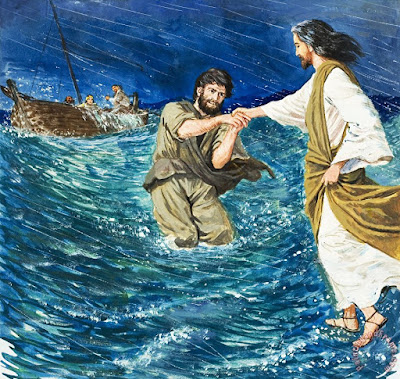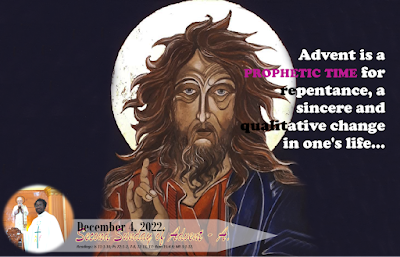REVELATION DAY.
August 9, 2020.
Nineteenth Sunday in Ordinary Time – A.
A Beninese proverb says, “God conceals himself from the mind
of man, but reveals himself to his heart.” And a Senufo proverb adds, “The nut
doesn't reveal the tree it contains.”
“Lord, let us see your kindness, and grant us your
salvation” (Ps 85:8). We all know this famous dictum attributed to St.
Irenaeus, “The glory of God is the living man.” However, many do not quote it
fully and we forget the second part which is as beautiful as the first: “The
life of man consists in beholding God.” We live for God. That is, for us to
live, we shall see God, for, in the vision of God is the perfection of life. We
are made immortal by beholding God. A creature who loses sight of God has no
reference and no life.
God’s self-revelation is the essence and the substance of
human life. Through the affirmations of St. Irenaeus, we can seize that
Creation, Revelation, and Redemption, are part of a unique plan, a unique
mystery, the mystery of God’s love. God created mankind for this last one to
see him and sing his glory. In Jesus, we have the perfection of all the divine
mysteries. For, in him and through him, God is fully revealed unto our
humanity.
Today’s liturgy puts a special accent on revelation or
manifestation of God. It could be said this is the Theophany Sunday. For we are
given to meditate on the revelation of God in the first reading and the
revelation of Christ Jesus in the Gospel, and this dual revelation unveils also
our own identity of children of God.
In the first reading, we have the mysterious Theophany of
the Horeb. The Lord God shows himself to the Prophet Elijah. One beautiful
element in that Theophany is that the Lord, oftentimes, is not where mankind
expects him to be. We cannot find God in a tremendous and strong wind. Nor is he
to be found in the earthquake, the fire, the tempest. God’s way is humility,
simplicity, and silence. Therefore, it was only in the still small voice, the
murmuring sound that Elijah discovered his presence. God does not reveal
himself to scare man, but rather to comfort and assure. Therefore, everything
that scares or frightens is not of God.
The experience of the Prophet happens to us in our daily
life. We always search for the Lord in the extraordinary and extravagance,
while he lives and transpires to us in our ordinary and under the simple and
humble signs. Many people live today in great confusion about God. Some think
that God is found only where they are miracles, where people speak in strange
languages, where pastors are invested with a superpower. It is time for us to
wake up from our spiritual dizziness and realizes that God, the all-powerful
and mighty, acts in our ordinary and not in the extraordinary. The devil is the
one who likes the noise and the extravagance. God instead dwells in simplicity. As could say the French proverb, “le
bruit ne fait pas de bien et le bien ne fait pas de bruit." Literally,
“Noise does not do good and good does not make noise.”
In the Gospel, the Lord Jesus also reveals himself to his
disciples. The Lord shows himself as master of the wind and the sea. Jesus
expresses his supreme authority over the sea in two ways. First, he walks on
the waters without sinking. Secondly, he calms the waves and heavy winds.
Besides the Lord self-revelation of his superpower and
identity as master of the forces of nature, the event of the walking on the sea
is an appeal to faith. Matthew states that the Apostles were alarmed, terrified
by the winds and the waves, and more frightened when they saw someone walking
towards them on the waters. They thought it was a ghost. Many people with
wavering faith are ghost minded. They see and hear ghosts everywhere. Caught by
so many fears, they always see what they are not supposed to see. Even during day
time, some see ghosts. The disciples, because of their fear and lack of
confidence took the Lord for a ghost.
He who has faith has no fear. The fears of the disciples
were the basic expression of their weak or somewhat inexistent faith. Amid
their distress, the voice of the Lord comes to restore confidence and
assurance, “Take courage, it is I; do not be afraid.” After hearing this, the
attempt of Peter to walk toward the Lord on the water could constitute a
challenge to himself. But this challenge is again cut short by fear. So, Peter
crises to the Lord for help, “Lord, save me!”
Brothers and sisters, the Lord always reveals himself to us.
He lifts us up and makes us rest on solid ground. However, our fears cause us
to lose hope and faith in him and we sink desperately into the abyss. God, yet,
never forsakes us. He knows our lack of faith. Thus, he keeps his hand always
ready and eager to save us and prevent us from falling into evil.
The presence of the Lord is our assurance. His kindness is
our pledge of salvation. We should nourish firm confidence in him and never let
any doubt or fear draw us away from him. The self-revelation of Christ is a
call to have faith in him despite the difficulties we may encounter.
St. Paul, in the second reading, speaks of the sorrows and
anguishes he was obliged to bear. But because he set his firm trust in God
through Christ Jesus, he did not give up. Though his sufferings were inflicted
on him by his countrymen, kinsmen, and those sharing the common faith and hope
with him, he did not despair. When one has encountered Jesus and built a firm
intimacy with him, no adversity, no trial can make him shrunk. For, God’s revelation is for our life not for
our damnation.





Comments
Post a Comment